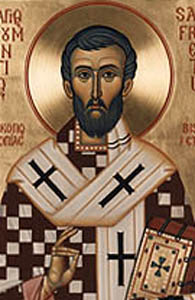 Christianity is expanding at a tremendous rate in Africa and Asia. Tens of thousands convert to Christianity each year in China alone. We usually assume that Christian churches in Africa and Asia stem from Western Europe or American missionary efforts over the last several centuries. This is true to some extent but there are ancient non-European churches which go back to the time of the Apostles. This is true of the Ethiopian Orthodox Church, a church of 40 to 45 million believers.
Christianity is expanding at a tremendous rate in Africa and Asia. Tens of thousands convert to Christianity each year in China alone. We usually assume that Christian churches in Africa and Asia stem from Western Europe or American missionary efforts over the last several centuries. This is true to some extent but there are ancient non-European churches which go back to the time of the Apostles. This is true of the Ethiopian Orthodox Church, a church of 40 to 45 million believers.
The Orthodoxy of the Ethiopian Orthodox Church differs from the Orthodoxy of the Russian, Greek, Georgian, Ukrainian, etc. Church in that the Ethiopians (together with the Coptic Orthodox Church, the Armenian Orthodox Church and others) believe that Jesus Christ had only one nature, divine. Whereas we believe that Christ has two natures, divine and human. In modern times theologians of all these churches have held discussions to try to understand what each church believes, how they differ and what they hold in common. We pray that God will aid their discussion – the great work of Christian unity.
The origins of Christianity in Ethiopia go back to the age of the apostles. If we look at the Book of Acts (8:26-40) we see the story of an official of the queen of Ethiopia converted and baptized by the apostle Philip. According to tradition, when this official got back to Ethiopia he laid the foundation for Christianity in this country, although not much is known about this period. The Ethiopian Church enters more clearly into the historical record with the activity of St. Frumentius, whom we commemorate on November 30th. St. Frumentius was a Syrian Greek who lived in the fourth century. He was captured by pirates when he was a child and sold as a slave to the king of Ethiopia. The king liked him and made him the teacher to the royal heir. The king freed St. Frumentius before he died and St. Frumentius remained in Ethiopia teaching and spreading the Gospel. He was so effective at preaching Christianity that many Ethiopians converted. Realizing that this church needed priests and bishops, he journeyed to Alexandria in Egypt. The Patriarch of Alexandria consecrated St. Frumentius a bishop and sent him back to Ethiopia where he continued preaching the Gospel and as we can see from this rather large church; his missionary efforts have borne much fruit.
The example of St. Frumentius and the Ethiopian Church shows us that Christianity cannot simply be thought of as a religion of Europeans and Americans, but a church for all humanity.
Fr. John
